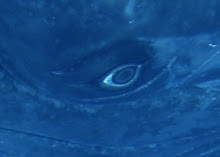Wednesday, December 12, 2012
Horror and Hope in Peru
BlueVoice has just completed a trip to the northern coast of Peru. We hope you will read the entirety of this blog. It contains information that is deeply disturbing but also offers solutions that are attainable and will provide huge benefits for both dolphins and the indigenous people of the region.
BlueVoice, working with the Peruvian NGO ORCA, went to San Jose, a fishing village north of Lima, to document the killing of dolphins for food and to gather information on levels of diabetes that could be linked to consumption of dolphin meat.
We expected the correlation of eating dolphin meat with diabetes incidence to be a complicated epidemiological task. It was not, simply because everyone in the town eats it. One woman, whose father had just died of diabetes, told us “this town is entirely sustained on dolphin meat.” Obviously the take of dolphins is far higher than we’d anticipated but what emerged from our work in San Jose is enormously hopeful.
The townspeople are terrified of the epidemic of diabetes that has emerged. The mayor invited Dr. Carlos Yaipen of ORCA/Peru and BlueVoice executive director Hardy Jones to address a town meeting that included the municipality, coast guard, health department and leaders of the fishing cooperative.
At the end of the meeting, at which Hardy held forth in Spanish for 20 minutes and Carlos spoke for two hours, we signed an official agreement with the town in which the mayor agrees to make all possible efforts to end dolphin killing for the health of the populace and the benefit of the oceans.
We have been invited to produce information sheets and conduct presentations to the town. Many of the fishermen have smart phones so we are devising plans to use this technology to reach them.
We collected hair samples from ten members of the community and will test them for mercury, and by analogy for organic pollutants.
We are now surveying fishing villages along the entire coastline of Peru to determine how widespread is the slaughter of dolphins.
We believe the desperate plight of the dolphins and people in the area of San Jose present a problem that demands redress. It also presents an opportunity to create a model that will apply to fishing areas worldwide where dolphins are killed as bushmeat. The clear connection between consuming dolphin meat and incidence of diabetes is a tool we can use to drive down demand for dolphin meat in places such as Taiji.
Please support this work with a contribution to BlueVoice. We have never encountered an environmental situation more susceptible to change nor any that is more instructive and applicable worldwide.
Subscribe to:
Comments (Atom)



